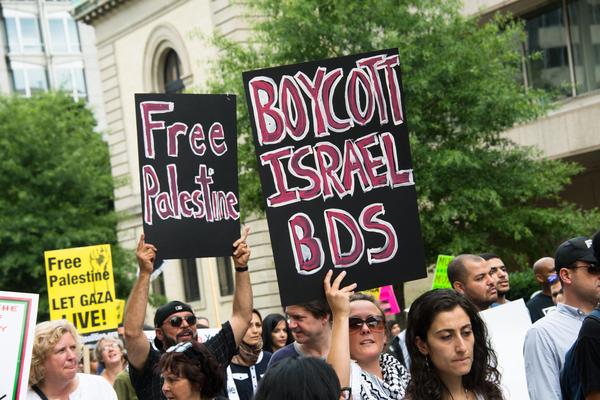Amherst College faculty have taken a leading role in promoting anti-Zionism on campus.
By Dion J. Pierre, The Algemeiner
The board of trustees of Amherst College, a liberal arts institution in western Massachusetts, has rejected an anti-Zionist faction’s proposal for divestment from companies which sell arms to Israel, the school announced on Monday.
“Guided by the fundamental principle of respecting the diversity of opinion in our community — and noting the practical challenges — the board has decided unanimously not to pursue the divestment actions requested in the faculty and [Amherst Associated Students] resolutions,” Amherst College president Michael Elliott, as well as the board of trustees chair and chair-elect Andrew Nussbaum and Chantal Kordula, respectively, said in a statement.
“To be very clear, the board’s position is neither an endorsement of Israel’s campaign in Gaza nor a statement in support of violence rather than peace,” they continued.
“It is, instead, a carefully considered response to the demand that the institution adopt a defined position on global events that are of intense interest to many at Amherst — events subject to ongoing debate and disagreement whose outcome will be shaped not by our investment decisions but by the decisions of governments across the world.”
Amherst College’s rejection of divestment — a core tenet of the boycott, divestment, and and sanctions (BDS) movement against Israel — delivers a blow to the anti-Zionist movement on its campus, blocking its aim of capturing the institution’s key policy making bodies.
While protests there have not involved the kinds of illegal acts perpetrated at other colleges and universities, Jewish student leaders have expressed concern about the rhetoric and tactics used by anti-Israel protesters, which have included comparing Israel to Nazi Germany, calling on the college to make “investments” in Hamas, and harassing Jewish students.
In May, leaders of Amherst Hillel published an open letter in The Amherst Student saying that “dangerous” ideas have proliferated on campus.
Antisemitic conspiracies of Jewish control have been posted by students on a popular social media application, the group explained, and the personal information of Jewish students has been leaked online.
In one incident, a Jewish professor’s private letter arguing against divestment was leaked on social media despite Amherst faculty’s insisting on keeping deliberations about the issue private.
“While not all anti-Zionism is antisemitic, these cases highlight the worrying role of antisemitism when discussing opposition to Israel,” the group continued.
“Many Zionist students have stopped expressing their views because of this antisemitism, resulting in a lack of productive discourse. On this campus, antisemitism silences the Zionist perspective so that the anti-Zionist voice thrives.”
Amherst College faculty have taken a leading role in promoting anti-Zionism on campus, writing letters in The Amherst Student and passing one of the divestment resolutions that the board of trustees ultimately rejected.
Faculty first called for the measure in March in a missive which accused Israel of violating norms of “international law and human decency.”
One of the professors who signed it, anthropology instructor Christopher Dole, later celebrated when the faculty senate voted for divestment.
“I’ve been at the college for 20 years, and this vote was an incredible, historic moment,” Dole told The Amherst Student.
“And I think it was not possible without the amazing work of students. Tireless, relentless work of reaching out and organizing and coordinating with faculty. And I just couldn’t be happier.”
Other elite colleges and universities have rejected the BDS movement following an explosion of anti-Israel protests and riots which roiled schools across the US during the final weeks of the academic year.
In May, Williams College rejected divestment in a report which said there is no “shared understanding” among scholars and experts, nor among its own community, about the Israeli-Palestinian conflict that would make divesting from Israel as morally cogent as divesting from South Africa in the 1980s or, more recently, fossil fuels.
Days later, Harvard University announced that it will no longer take sides in polarizing political debates.
The new university policy, described as “institutional neutrality,” was the final recommendation of a report issued by a faculty group which interim president Alan Garber convened to study whether Harvard “should use its official voice to address matters of social and political significance.”
According to The Harvard Crimson, Garber, as well as the Harvard Corporation, embraced its conclusion.
MAKE THE LAND OF ISRAEL EVEN MORE BEAUTIFUL!
PLANT YOUR VERY OWN FRUIT TREES IN ISRAEL!
Farmers near the Gaza border lost family, friends and workers. Spring is here, and they desperately need help to replant the farms. Join us in blessing the People and Land of Israel.
“I will ordain My blessing for you…” (Leviticus 25:4)
